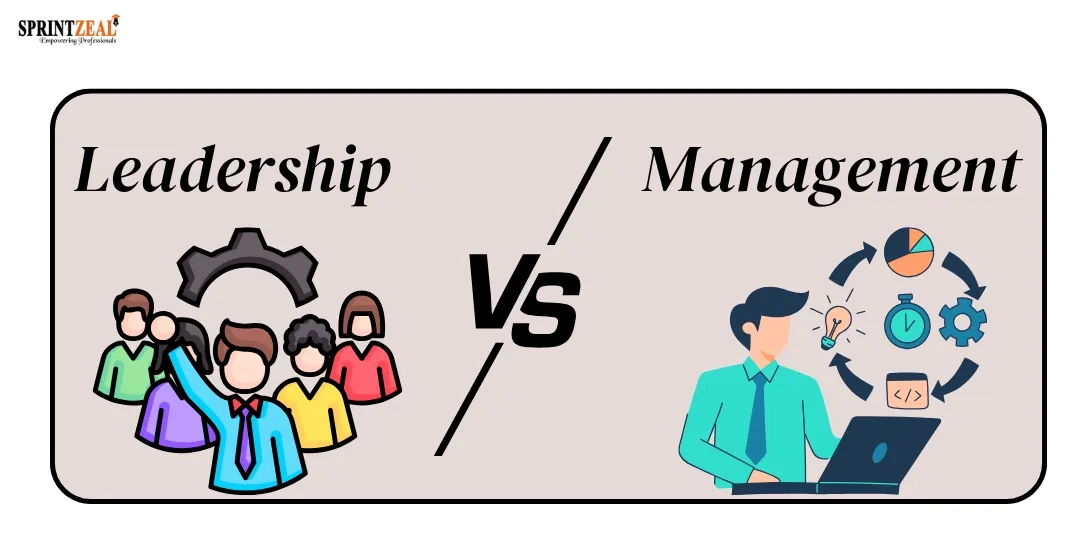Leadership vs. Management: What’s the Difference?
-
 By Sprintzeal
By Sprintzeal - Published on Oct 28 2025

In the rapidly changing world of business, the terms "management" and "leadership" are more frequently used interchangeably. Many people think that a great manager is also a great leader. Although both concepts have commonalities, they are not interchangeable. In the modern workplace, one has to understand Leadership vs. Management.
Managing a concern, it is necessary to prioritize the use of systems and procedures, as well as accomplish the corporate goals through planning and organizing the use of these systems and procedures. Leadership, however, is about motivating people. Effective leadership means getting things done with people. It is conveying a vision and getting people to have a purpose. So if you are going to lead, step out and start pursuing Leadership Skills Training and be a successful leader.
The manager's function is to provide efficiency and stability, while the leader's function is to interrogate and dispute the current order. In fact, an organization is in need of both a critic and a manager who will keep things in order. Some of the best leaders or managers can shift and accommodate different roles as it addresses the needs of the situation.
Navigating complications, encouraging engagement of teams, and sustaining an organizational climate demand knowing when to lead and when to manage. Both roles are still necessary in the marketplace of today, which operates quickly.
In this article, we will identify and describe the differences and the similarities and their practicalities, of Leadership vs. Management, and how they are equally important in all organizations.
Table of Contents
- Defining Management and Leadership
- The Historical Evolution of Leadership vs. Management
- The Competencies: Leadership vs. Management
- Leaders Look at
- Leadership vs. Management in the Modern Workplace
- Leadership vs. Management must get along in the fast-paced world of today.
- Emotional Intelligence in Leadership vs. Management
- Strategies to Enhance Your Competence in Leadership and Management
- Conclusion
Defining Management and Leadership
Let us first understand the actual meanings of Leadership vs. Management before looking into their differences.
Leadership
Leaders can be defined as those people who direct others towards a shared goal. A true leader gains their consensus and incorporation into their vision. They also need emotional intelligence and creativity, as well as forward thinking. A leader always opens up by explaining the why, the goal, and the others' path along. Leadership is not only about positions or duties but also about the right attitudes, mentalities, and the ability to create trust and loyalty.
Vision and change have a very strong relationship with leadership. A leader is the one who revokes the existing order, endorses innovation, and allows people to visualize a better and different future from the present one.
Management
In contrast, management is the process of arranging, planning, and directing resources in order to accomplish predetermined goals. How the procedures, frameworks, and systems that maintain an organization's effectiveness work is what managers deal with.
A competent manager makes sure that projects, procedures, and people all line up with corporate objectives. The focus of management is on execution, control, and consistency. Without those, even the best ideas fail.
When we distinguish between Leadership vs. Management, Management is all about execution and organization. But leadership is about a view of the future, inspiring us.
The Historical Evolution of Leadership vs. Management
To understand Leadership vs. Management, we need to look at their history.
Management's Origin
The Industrial Revolution helped to popularize the idea of management. Structured systems were necessary for factories to manage labor, efficiency, and output. Principles to standardize and optimize work were created by thinkers such as Henri Fayol (Administrative Theory) and Frederick Taylor (Scientific Management). Control, hierarchy, and discipline, qualities necessary for success in the industrial sector, became synonymous with management.
The Rise of Leadership
Leadership, as we think of it today, arose somewhat later in human history, specifically around the middle of the 20th century, when the corporate world began to embrace innovation, drive, and creativity in its ranks. Related theories, proposed by individuals like Warren Bennis, James MacGregor Burns, and Kurt Lewin, were particularly focused on what we, as humans, do, starting with our behaviors, having a vision, and having an emotional attachment to that vision.
Today's institutions understand that leadership enables change, while management ensures stability. A collaboration of need, not superiority, therefore frames how we think about Leadership vs. Management.
The Competencies: Leadership vs. Management
Let us first concretely address the relevant and profound differences between Leadership vs. Management.
| Aspect | Leadership | Management |
|---|---|---|
| Focus | Vision, inspiration, and people | Processes, systems, and structure |
| Goal Orientation | Long-term transformation | Short-term results and efficiency |
| Approach | Influencing and motivating | Planning and controlling |
| Decision-Making | Intuitive, risk-taking | Analytical, risk-averse |
| Primary Function | Create direction and meaning | Ensure order and stability |
| Communication Style | Inspirational and empowering | Directive and instructional |
| View of People | People are assets and partners | People are resources to manage |
Leadership vs. Management In Practice
To be more relatable, we can use examples from the real world.
Steve Jobs vs. Tim Cook of Apple
Steve Jobs is a perfect case of leadership. A visionary, innovative, and impactful. He instigated creativity and reconsidered convention. Tim Cook is clearly a management guy. He safeguarded profits while optimizing operations and the supply chain. Jobs came up with the dreams; Cook makes them happen long-term. Both individuals are important in the process. Together, they depict the transparency of the Leadership vs. Management ideal.
Elon Musk, CEO of Tesla and SpaceX
Inspired by a vision to help humanity through colonization of other planets and sustainable energy, Elon Musk exemplifies leadership. However, underlying all of Musk's bravado is a group of skilled management teams who have borne the brunt of Musk's vision and built it into actionable, pragmatic, and timely objectives. Without management, there is no objective; without leadership, leadership is fiction.
Leaders Look at
Understanding the difference between Leadership vs. Management also means understanding that both require different abilities that complement each other. Although management and leadership are often interconnected in practice, the different abilities that distinguish management and leadership are predicated on different styles of thinking, feeling, and behaving. Managers are builders of systems and controllers of order, while leaders are fundamentally architects of vision and instigators of change. When both work together, greatness in an organization can be realized.
Essential Competencies of Leadership
Effective leadership starts with the ability to motivate, inspire, and influence the actions of others toward a common cause. They are focused on impact, not on their own power. Great leaders develop, foster purpose, and inspire belief as well as provide direction. The key competencies that define effective leadership are as follows:
Strategic Thinking and Vision
Vision, or the ability to think forward and envision a better state, is the cornerstone of leadership. It's one thing to have a vision; the leader also needs to be able to get others to have that vision, too. Strategic thinking involves the cognitive dimension of awareness of the outer landscape of the business, changing predictions, trust, and linking corporate goals to and verging on certain expectations of realities. I'm not talking about Satya Nadella and Nelson Mandela as authentic leaders.
They deal with the complexity of that world by staying laser-like in their vision and never missing the broader picture. You also take up a course on Strategic Leadership to better understand.
Empathy and Emotional Intelligence
There is a saying that emotional intelligence is the lifeblood of leadership. Emotional intelligence (EI), also referred to as EI or EQ, consists of motivation, self-regulation, self-awareness, empathy, and social skills. Leaders who engage with their teams have a high EQ and create trust among their teams, and find ways to mediate conflict amicably and connect with others in genuine and real ways. Empathy, or the ability to sense and understand others from their position, is a power to influence and have followers.
Talents: Leadership Talents and Management Talents
Valuing leadership over management also means valuing each for its divergent but complementary talents. While leadership and management often clash in practice, the states we assign to each come from different orientations of thinking, feeling, and doing. Leaders are somewhat the architects of vision and orchestrators of change, while managers are builders of systems and agents of order. The overlap of the two means organizational greatness.
Leadership Competencies
Leadership competencies are those that enable one to influence, motivate, and involve people to align with a single overarching vision. Leadership is not necessarily about control. Rather, it is about influencing positively. Excellent leaders not only set limits but also build trust, create a feeling of purposeful engagement, and encourage personal development. The following is a compilation of the main competencies that enable great leadership:
Vision and strategic thinking:
Leadership starts with active visioning, the power to envision beyond the here and now and think about a potential future. Leadership begins with active visioning, which is the ability to visualize beyond the present and imagine a future. Leaders must not merely envision the future but get other people to think that it is significant and thrilling, and get all the people to strive to achieve it.
Strategic thinking is seeing the big picture, identifying the changes at the initial stage, and ensuring the companies are committed to achieving their objectives in accordance with the future opportunities to develop. Two such leaders were Nelson Mandela and Satya Nadella, who always had the bigger picture in mind.
Empathy and Emotional Intelligence.
There is just a single-handed opinion that emotional intelligence (EI) is a valued leadership quality. EI has self-regulation, empathy, social competence, self-awareness, and motivation. EI leaders build trust within groups, manage conflict in a dignified manner, and relate to individuals in a consistent and genuine manner. Empathy, or feeling and comprehending other people and their points of view, turns followers into partners and authority into influence.
Persuasion and Communication
Great communicators are great leaders. Great communicators make their message heard both in the head and heart by clearly and passionately presenting their vision. To be effective in engaging your audience to take action, persuasion does not only represent persuasive speaking but also involves listening, storytelling, and connections with people. A leader's words can spur people to action, alter their thinking processes, and unify people to change.
Creativity and Flexibility
In this time of disruption, leaders have to embrace creativity. They see failure as an opportunity to learn, develop creativity, and remain flexible throughout the change process. Flexibility will ensure resilience (or not losing focus as you change course). By posing questions that challenge assumptions and fostering imagination, leaders who create innovative cultures tend to reshape industries.
Taking Chances and Being Brave
Making unpopular choices in uncertain times is a part of the leadership responsibility. Successful leaders are unafraid of calculated risk and are confident in the face of uncertainty because they understand they often have to make difficult decisions that have real meaning and step out of their comfort zone in order to grow and be successful, so this practice does not intimidate them.
Essential Management Capabilities
Logic, structure, and execution, on the other hand, constitute the foundation of management skills. Managers convert goals into quantifiable results. They guarantee that organizational resources, financial, operational, and human, are used effectively to accomplish objectives. Managers fulfill the dreams of leaders. Strong management is built on the following competencies:
Organizing and Planning
Planning is the initial step in management. It is where goals are set, schedules are established, and resources needed to achieve them are found. Organizing comes next and ensures that duties, roles, and workflows are suitably established. It is the framework that enables teams to operate effectively that is created by managers. Even generated leadership will never work unless you add this discipline.
Prioritizing and Organizing Time
Effective managers can actively manage time and focus it most critically and thus balance competing demands. They achieve productivity without exhaustion by distinguishing between critical and urgent tasks. Efficiency and consistency in operations demand analytical thinking and concentrated attention, which are reflected in this capacity for prioritization.
Allocating Resources and Budgeting
Using resources wisely is a crucial managerial ability. Managers are required to estimate spending, create budgets, and make sure that assets are used as efficiently as possible. Financial restraint promotes sustainable growth in addition to preserving profitability. Management makes sure that a new product introduction is both financially and operationally possible, while leadership may provide the impetus.
Monitoring Performance
The guardians of accountability are managers. They gauge progress toward objectives and pinpoint areas in need of development using metrics, KPIs, and feedback systems. This emphasis on performance aids in upholding standards, rewarding excellence, and quickly correcting deviations. Consistent operational results from strategic objectives are guaranteed by effective monitoring.
Problem Solving and Analytical Thinking
Organizations face problems, whether financial, interpersonal, or logistical. Managers recognize problems and solve them based on data, reasoning, and critical thinking. Instead of relying on his gut, they trust in the data and the facts. Through analytical thinking, managers handle complexity with accuracy and foresight.
To put it briefly, management abilities guarantee consistency, effectiveness, and dependability. They serve as the framework for inspiring concepts, transforming dreams into real accomplishments.
Leadership vs. Management in the Modern Workplace
The key difference between management and leadership is expressed in this conflict. Leaders are born with opportunities. They are investigating innovation, imagining change, and challenging presumptions when they pose the "What if?" question. Their research is broad and aims to inspire change and uncover new opportunities.
On the other hand, managers concentrate on execution. Their desire for accuracy, structure, and viability is shown in their "How?" question. They transform concepts into well-organized strategies, guaranteeing that the goal is successfully carried out.
In a product development team, for instance:
"What if we could build a technology that completely redefines user experience?" a leader might wonder.
"How can we allocate resources, set timetables, and coordinate teams to make that happen?" would be a manager's response.
Both mentalities are essential. The manager guarantees performance, whereas the leader gives direction. Organizations stagnate when they lack the "what if," and they collapse under unrealized ambition when they lack the "how."
Closing the Skill Divide
The line separating management and leadership is becoming increasingly blurred in competitor businesses. Leaders now have to manage, while managers are supposed to lead. Basically, a professional who is competent will combine both empathy and analysis, along with discipline and vision.
Without managerial discipline, developing leadership abilities might result in ambitious goals that are never realized. On the other hand, if management is mastered without leadership insight, it may lead to strict control and minimal creativity. Integration is the ultimate aim, a balance in which structure supports vision and vision supports structure.
This is the real synergy between management and leadership: the operational excellence of management combined with the creative power of leadership.
The Psychological Basis of Leadership vs. Management.
Leadership, contrasted with Management, psychology concerns human behavior and motivation.
Leaders tend to emphasize intrinsic motivation, which is tapping into people's emotions, values, and ultimately goals, and to enlist people to support a cause.
Management tends to focus on extrinsic motivation, including accountability, performance goals, and rewards. Managers ensure consistency and discipline.
Both types of motivation are needed for a great corporation to find an equilibrium between productivity and creativity.
Leadership vs. Management must get along in the fast-paced world of today.
The Leadership vs. Management debate has changed in a bigger way since the beginning of the 21st Century. The problems that are faced by the management as compared to leaders, known as remote work, digital change, and cross-cultural teams, are becoming more commonplace.
It is expected of modern managers to lead and of modern leaders to manage. These days, businesses respect "manager-leaders" who can implement as well as inspire.
For example:
- Nonprofits need leaders to advocate for causes and managers to manage finances and logistics, and tech start-ups need leaders to imagine new markets but managers to scale operations.
- Government institutions rely on leaders for innovation and transformation but managers for the implementation of policies.
Emotional Intelligence in Leadership vs. Management
Comparing Transactional Management with Transformational Leadership: Examine these opposing approaches to gain a deeper understanding of Leadership vs. Management.
Leadership Through Transformation
Leaders who are transformational empower and inspire others. They inspire followers to put the greater good ahead of their own interests. They prioritize emotional involvement, creativity, and long-term vision.
Management of Transactions
Transactional managers prioritize assignments, objectives, and outcomes. They fix deviations and reward performance. Their efficiency, predictability, and organization are their strongest points.
Neither strategy is necessarily better. The secret is striking a balance between vision and execution by fusing transformation with transaction.
Strategies to Enhance Your Competence in Leadership and Management
While emotional intelligence (EI) is often the determining factor between Leadership vs. Management.
To relate, feel with others, and communicate, leaders primarily bank on emotional intelligence (EI). They can sense emotions and respond to them naturally. While they also require emotional intelligence, managers focus more on fairness and impartiality in decision-making.
A high EI manager can sustain morale, and a high EI leader can generate loyalty. Together, they create emotionally stable work climates.
Leadership vs. Management during Crisis Situations
The actual difference between leadership and management comes to the fore in a crisis situation. Leaders provide direction in the midst of uncertainty. They remain calm, communicate clearly, and evoke hope. Managers ensure continuity of operations. They handle resources, logistics, and stability.
During the COVID-19 pandemic, for example, managers put in place telework systems, supply chain changes, and health protocols, while leaders fostered resiliency and solidarity. Both were necessary.
The Future of Management vs. Leadership
Emotional Intelligence in Leadership vs. Management
The human side of leadership is becoming increasingly important as technology and artificial intelligence change the company's face. Machines can be used to do work, but they don't have emotions or vision.
In the future:
Leadership will focus on flexibility, creativity, and emotional intelligence. Management will gravitate toward process optimization, automation, and analytics.
While there will be no disappearance of the gap between management and leadership, successful companies will be defined by integration.
Conclusion
A good set of skills in leadership and management is most certainly a requirement for success in this 21st-century working environment.
Step 1: Start with self-knowledge
Knowing your strengths and weaknesses will assist you in understanding if you are essentially more of a management (organizational) individual or a leadership (visionary) individual. Without knowing yourself, it is practically impossible for you to be well-rounded.
Step 2: Concentrate on your learning
Management courses that are skills-based, like planning and analysis, can be more helpful to you with your active engagement. While leadership courses will render you emotionally intelligent and provide you with the power to influence people.
Step 3: Learn to delegate
But the leaders who struggle with letting go are most likely on the same level as managers who engage in micromanaging. Delegation is one of the mechanisms through which a leader establishes trust and responsibility, and at the same time, it allows for freedom for the teams to be empowered.
Step 4: Communicate clearly and concisely
Managers primarily do the act of directing when they communicate, whereas leaders utilize communication most for motivating. Attempt to identify the place that distinguishes directing from motivating in your communication, and then move ahead from there.
Step 5: Accept Change
The modern professional is defined by their capacity for both strategic and operational adaptation.
The Effects of Balancing Leadership vs. Management on Organizations
Businesses that combine management and leadership perform better than those that only use one.
According to a Harvard Business Review study, organizations that prioritize both management and leadership experience improved financial success, employee engagement, and creativity.
The lesson learned? Management creates the reality, while leadership develops the dream.
Leadership vs. Management: A Partnership, Not a Rivalry
In the Leadership vs. Management debate, the most important realization is that one cannot succeed without the other. Management provides discipline; leadership provides guidance. Management mobilizes; leadership inspires.
"Management is doing things right; leadership is doing the right things," as Peter Drucker famously stated.Both are essential. When together, they push companies to achieve excellence.
Subscribe to our Newsletters
Popular Programs
Trending Posts
Study Plan: A Practical Guide to Building One That Truly Works
Last updated on Sep 4 2025
How to become an EV engineer?
Last updated on Oct 29 2025
Exam Prep: Time Management and Productivity Hacks
Last updated on Sep 4 2025
Change Management Skills: Top 5 Leadership Skills for 2026
Last updated on Dec 27 2024
Mastering the Art of Internal Negotiation
Last updated on Dec 30 2025
5 Productivity Strategies of High-Performing Entrepreneurs
Last updated on Dec 29 2025
Categories
- Other 69
- Agile Management 45
- Cloud Computing 56
- Project Management 172
- Big Data 66
- Business Management 88
- Digital Marketing 78
- IT Service Management 29
- Programming Language 58
- AI and Machine Learning 76
- IT Security 112
- Quality Management 78
- IT Hardware and Networking 25
- Microsoft Program 4
- Workplace Skill Building 13
- Risk Management 9
- Information Security 8
- Leadership and Management 9
- Corporate Training and Development 1
Trending Now
Change Management Skills: Top 5 Leadership Skills for 2026
ArticleStudy Plan: A Practical Guide to Building One That Truly Works
ArticleExam Prep: Time Management and Productivity Hacks
ArticleKey Pillars of Success in the Tech World: Learning, Testing, and Visibility
ArticleHow to become an EV engineer?
ArticleTop 5 High Income Skills to Learn in 2026
Article5 Productivity Strategies of High-Performing Entrepreneurs
ArticleMastering the Art of Internal Negotiation
Article
















